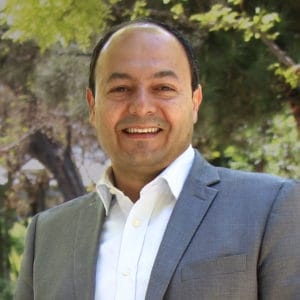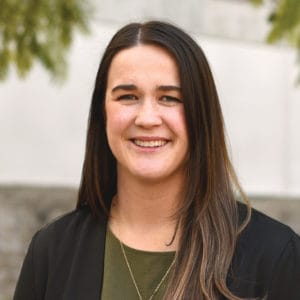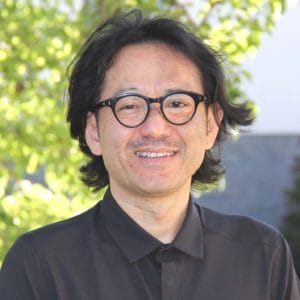Faculty
-

-

Jamie Felicitas-Perkins
Assistant Professor of Practice of Community and Global Health,
Director of the Doctor of Public Health (DrPH) programResearch Interests
Determinants of health among racially/ethnically diverse, underserved, and underrepresented populations; health disparities among Asian Americans, Native Hawaiians, and Pacific Islanders; cancer disparities and contributing factors; cancer prevention; tobacco control and prevention; tobacco-related disparities; and community-based participatory research
-

Darleen V. Peterson
Professor of Practice, Community and Global Health
Senior Associate Dean for Academic Affairs
Director of the Certificate and Master of Public Health (MPH) programsResearch Interests
Evaluation of Health Communication Campaigns, Effects of Pro- and Anti-Tobacco and Alcohol Marketing; Public Health Education Accreditation
-

Jessica Clague DeHart
Associate Professor of Community and Global Health
Research Interests
Epidemiology, chronic disease, cancer etiology, cancer survivorship, molecular and genetic epidemiology, lifestyle intervention trials, exercise, nutrition, quality of life, community-based interventions
-

Stewart I. Donaldson
Distinguished University Professor
Executive Director, Claremont Evaluation Center
Executive Director, The Evaluators' Institute (TEI)
Research Interests
Positive Organizational Psychology, Health/Well-Being & Positive Functioning Across Cultures, Program Design & Re-Design, Culturally Responsive Theory-Driven Measurement & Evaluation
-

C. Anderson Johnson
Professor
Founding Dean, School of Community & Global HealthResearch Interests
Transnational prevention of tobacco, alcohol, and drug abuse, HIV-AIDS, and obesity; Community-based substance abuse prevention; Social and environmental influences on health; Community and mass media approaches to health
-

Paula Healani Palmer
Associate Professor of Community and Global Health
Director of the PhD in Health Promotion Sciences programResearch Interests
Determinants of health among ethnically diverse populations; Community-based participatory research among under-served, underrepresented populations; Health of Pacific Islanders and South Asians; Technology applications for health behavior interventions; Tobacco control, mental health, disaster management, health of migrants and indigenous peoples; Maternal and child health
-

Kim D. Reynolds
Professor
Research Interests
Nutrition and physical activity, Health promotion and disease prevention, Diabetes and obesity
-

Alan Stacy
Professor
Associate Dean for Faculty AffairsResearch Interests
Application of theories and methods of human memory; Cognitive neuroscience and social cognition to health behavior: etiology, prevention, and media effects; Translation of basic research to field research, high-risk populations, and prevention; Validation issues in assessment
-

Bin Xie
Professor of Community and Global Health
Director of the Applied Biostatistics (MS) programResearch Interests
Obesity prevention; Tobacco control; Diet, physical activity, body image in adolescents; Psychological adjustment to obesity; Diabetes and cancer; Application of statistical analysis in prevention research
-

Javad Salehi Fadardi
Research Full Professor of Community and Global Health
Research Interests
Application of theories and methods of human goal-seeking and motivated behavior; cognitive neuroscience and goal-related cognitive processes related to health behavior; translation of basic research to field research, high-risk populations, and e-Health technologies
-

Bree Hemingway
Assistant Clinical Professor of Community and Global Health,
Associate Director of the Master of Public Health (MPH) program,
Co-director of the Doctor of Osteopathic Medicine (DO)/MPH dual programResearch Interests
Program evaluation, health disparities, and public health workforce development
-

Eric Houston
Research Assistant professor
Research Interests
Application of theories and methods of goal-seeking and motivated behavior; cognitive neuroscience and goal-related cognitive processes related to health behavior; translation of basic research to field research, high-risk populations, e-Health technologies, and prevention
-

Rachaline Napier
Clinical Associate Professor of Community and Global Health
Research Interests
Global Health, Epidemiology
-

Gary Selnow
Research Professor
Research Interests
Health promotion and disease prevention, translation of basic research to field research, high-risk populations, e-Health technologies
-

Yusuke Shono
Assistant Professor of Community and Global Health
Research Interests
Application of theories and models of cognitive processes; Implicit cognition and health behavior; Cognitive screening and assessment; Measurement of health disparities and inequity; Measurement and validation in cognitive, behavioral, and health outcome assessment
Curriculum
The curricular criterion for the DrPH degree is framed in terms of five related components: foundational and concentration-specific skills and content, professional disposition, application and practice, and integrative experience. The DrPH degree has distinct and defined learning objectives and a delineation of associated competencies for coursework, the practice experience, and the integrative learning experience.
Core Courses (35 units)
- Foundations of Global Health: A Transdisciplinary Approach (4 units)
- Seminar in Grant Writing & Proposal Development (4 units)
- Foundations of Program Planning (4 units)
- Designing and Evaluating Health Behavior Interventions (4 units)
- US Health Policy (3 units)
- Advanced Theoretical Foundations in Health Education & Promotion (4 units)
- Advanced Statistical Methods I (4 units)
- Advanced Research Methods (4 units)
- Qualitative Research Methods (4 units)
Concentration Courses (10 units)
- Advanced Topics in Public Health Management (3 units)
- Health Equity in Research and Practice (3 units)
- Positive Organizational Psychology (4 units)
Transdisciplinary Course (4 units)
- Transdisciplinary Changemakers. Justice-Centered Frameworks for Education (4 units)
Advanced Practicum (0 units)
Students can choose:
1) Community Lab Course Series (0 units)
- Community Based Translational Research to Promote Population Health (0 units)
- Health Systems Engineering and Integration (0 units)
- Advanced Practicum in Public Health (0 units)
OR
2) Advanced Practicum in Public Health (0 units)
Learning Outcomes
- Demonstrate knowledge of the Public Health core areas of epidemiology, biostatistics, environmental health, health systems management, and the biological, social, and cultural aspects of health and disease in addressing and solving problems
- Design, conduct, and analyze data from well-designed formative research for the purpose of developing and evaluating appropriate public health interventions in diverse contexts
- Develop and apply professional leadership and management skills to coordinate global health interventions in diverse settings
- Engage in evidence-based policy development, analysis, and translation processes
- Design well-developed funding proposals
- Engage in advanced field experience that allows students to develop competencies in advanced practice skills, including leadership and pedagogy
- Generate a field-based product consistent with advanced practice designed to influence program, policies, or systems addressing population health
Who Should Apply
As an ideal candidate for the DrPH program, you hold a Master’s in Public Health (MPH) and have a strong desire to emerge as a leader in the public health sector. You embody a range of attributes, such as the capacity to contribute to and engage with diverse communities, the ability to collaborate across different disciplines, and personal qualities like integrity, honesty, and trustworthiness. You’re not only responsible, dedicated, and persistent, but you also demonstrate a lifelong commitment to personal and professional growth. As the ideal candidate, you have the potential to make significant contributions to the field of public health, the SCGH, and the DrPH program itself. Your educational and professional goals align seamlessly with the DrPH program’s mission, which is to prepare professionals to assume leadership roles in enhancing global public health through improved research, practice, policy-making, and system response.
Applicants that show exceptional potential for success in the DrPH program may be admitted without an MPH if they can clearly demonstrate their ability to contribute to the field and excel in the program. However, they will be required to satisfactorily complete the prerequisite courses (as outlined in the core course requirements for the MPH degree). Completing the five core courses, totaling 20 units, entitles students to a formal certificate in the Foundations of Public Health.
Program Features
Networking Opportunities
With more than 80 chapters throughout the world, the Delta Epsilon chapter of the Delta Omega Honorary Society in Public Health at Claremont Graduate University opens up numerous academic and professional opportunities, including:
- Electing students, faculty, alumni, and honorary members based on high academic standards and outstanding performance in scholarship, teaching, research, and community service.
- Connecting students to a vast networking pool of 15,000 members from the top echelons of graduate schools, programs of public health, and the public health community.
- Opening doors for faculty and students to network and positively impact public health initiatives in the Southern California region.
- Boosting students’ transition from academic life to professional life.
Application Guidelines
| Item | Description |
|---|---|
| Application Fee | $135 |
| Official Transcripts | Yes |
| Letters of Recommendation | 3 |
| Statement of Purpose | Yes |
| Resume | Yes |
| Other Requirements | Writing sample, English proficiency exam |
CGU operates on a priority deadline cycle. Applicants are strongly encouraged to submit complete applications by the priority dates in order to assure maximum consideration for both admission and fellowships.
Once the priority deadlines have passed, the University will continue to review applications for qualified candidates on a competitive, space-available basis. The final deadlines listed are the last date the University can accept an application in order to allow sufficient time to complete the admissions, financial aid, and other enrollment processes.
Spring 2024
Priority Deadline – November 1, 2023
Final Deadline (International) – November 15, 2023
Final Deadline (Domestic) – December 1, 2023
Classes begin – January 16, 2024
Summer 2024
Priority Deadline – February 1, 2024
Final Deadline (International) – March 1, 2024
Final Deadline (Domestic) – April 1, 2024
Classes begin – May 13, 2024
Fall 2024
Priority Deadline – February 1, 2024
Final Deadline (International) – July 5, 2024
Final Deadline (Domestic) – August 1, 2024
Classes begin – August 26, 2024
Application Checklist
Applications are accepted on a rolling basis. For priority admission and fellowship consideration, applications should be submitted by the priority deadlines.
All supporting documents should be sent to Claremont Graduate University at the following address:
CGU Office of Admissions
150 E. 10th Street
Claremont, CA 91711
Application materials, including electronic transcripts, can also be sent via email to admissions@cgu.edu.
University Application Requirements
Applicants to the Master of Public Health and Doctorate in Public Health programs in the School of Community and Global Health should apply using the SOPHAS application. SOPHAS is a service of the Association of Schools and Programs of Public Health, which represents the CEPH-accredited schools and programs of public health. You will not be required to submit an additional application to CGU directly; submission through the SOPHAS portal is all that is required.
The application fee is non-refundable.
Applicants must submit a sealed, official transcript from every undergraduate and graduate institution that has granted the applicant a degree. Electronic transcripts sent to admissions@cgu.edu are also accepted. For undergraduate coursework, applicants are required to submit proof of a completed bachelor’s degree from a regionally accredited college or university.
Applicants currently earning a degree that will be completed prior to attending CGU are required to submit a transcript showing work in progress for evaluation purposes. Once the degree has been granted, a final official transcript documenting the degree conferred must be submitted to CGU.
International applicants are advised to review the International Transcript Guidelines for additional information on submitting international transcripts.
Applicants must submit a copy of their resume.
A valid score on one of the following examinations TOEFL, IELTS, Pearson PTE scores is required of all non-native English speaking applicants. The examination is not required for the following applicants:
- Citizens or permanent residents of countries where English is the sole official language of instruction, e.g., Australia, Bahamas, Barbados, Canada (except Quebec), England, Ghana, Ireland, Jamaica, Kenya, New Zealand, Nigeria, Scotland, St. Vincent and the Grenadines, Trinidad, Tobago, Uganda, and Wales (see the CGU Bulletin for a complete list of accepted countries).
- Applicants who hold an undergraduate or advanced degree, or will have earned such a degree prior to enrolling at CGU, from an institution in the US or in countries where English is the sole official language of instruction (see above).
- Applicants who have successfully completed an academic English pre-master’s or intensive graduate bridge program from a nationally recognized, regionally accredited four-year college or university in the United States in the last two years, with submitted evidence of successful completion, and subject to curriculum approval.
CGU’s school code for the TOEFL exam is 4053.
International applicants are encourage to visit our International Applicants page for more information, including score requirements.
When filling out the online application, please enter references acquainted with your potential for success who will submit a written recommendation on your behalf. In most academic departments, references from faculty members who can speak to your academic ability are preferred; applicants with substantial work experience may request professional references. Please do not enter family members as references.
You will be required to input information for your recommenders (whether they are submitting online or not) in the “Recommendations” section of the online application. Please follow the directions in this section carefully before clicking on “Recommendation Provider List” to input the names and contact information for each recommender. You will have an opportunity to indicate if the reference writer will be submitting online. These reference writers will receive an email from CGU with instructions on submitting an online recommendation.
Recommenders who are indicated as offline will not receive an email from CGU with instructions to submit. These reference writers can submit via traditional mail and should use the supplemental New Student Recommendation Form. Recommenders can also email their letter of recommendation to the Office of Admissions at admissions@cgu.edu.
Please submit a 2-3 page statement of purpose that details your academic and/or professional achievements, your specific areas of research interest within your desired field of study, why you are a strong candidate for graduate studies at CGU, and your career goals.
All applicants are required to submit a writing sample of previous work in addition to the statement of purpose. You may submit samples of any length you feel indicate your writing ability, but please note that we will be unable to return any items submitted as part of your application (please, no books). Most applicants submit one or two scholarly papers or excerpts of around 10-15 pages. Writing samples should not exceed 30 pages.
Cost & Aid
ESTIMATED TUITION (CALIFORNIA RESIDENTS, NON-RESIDENTS, INTERNATIONAL)
| Program | 49 units (students can transfer up to 13 units) |
| Tuition per unit* | $2,020 |
*Based on 2023-2024 tuition rates.
STUDENT FEES (PER SEMESTER)
| $245 Student Fee |
| $150 Technology Fee |
| International Student Services Fee*: $661 fall semester, $776 spring semester **Applies to all international students (F-1 visa only) who are registered in coursework, doctoral study, or continuous registration. The fee is assessed each fall and spring semester for annual ISO accident and sickness plans and administrative fees. Subject to change. |
For estimates of room & board, books, etc., please download CGU’s Cost of Attendance 2022-2023 .